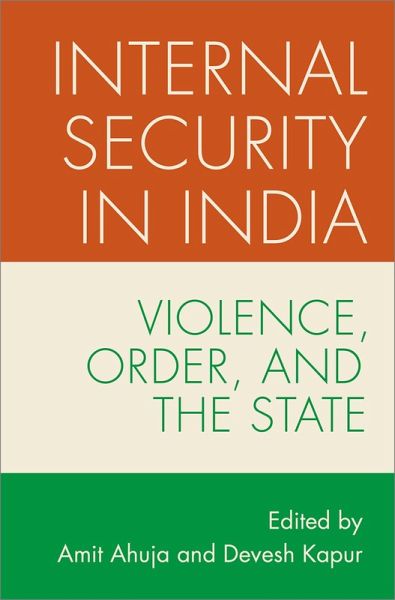
Internal Security in India (eBook, PDF)
Violence, Order, and the State
Redaktion: Ahuja, Amit; Kapur, Devesh
Versandkostenfrei!
Sofort per Download lieferbar
12,95 €
inkl. MwSt.
Weitere Ausgaben:

PAYBACK Punkte
6 °P sammeln!
An overarching exploration of the Indian state's approaches, laws, and organizations that maintain order and contain violence. Maintaining order and containing violence-the core constituents of internal security-are fundamental responsibilities of any government. Yet, developing countries find this task especially challenging. In Internal Security in India, Amit Ahuja, Devesh Kapur, and a cast of leading scholars on the subject focus on India's security and the threats it faces. Since Independence, the Indian state has grappled with a variety of internal security challenges, including insurgen...
An overarching exploration of the Indian state's approaches, laws, and organizations that maintain order and contain violence. Maintaining order and containing violence-the core constituents of internal security-are fundamental responsibilities of any government. Yet, developing countries find this task especially challenging. In Internal Security in India, Amit Ahuja, Devesh Kapur, and a cast of leading scholars on the subject focus on India's security and the threats it faces. Since Independence, the Indian state has grappled with a variety of internal security challenges, including insurgencies, terrorist attacks, caste and communal violence, riots, and electoral violence. Their toll has claimed more lives than all of India's five external wars put together. As the contributors in this volume analyze how the Indian State has managed the core concern of internal security over time, they address three broad questions: How well has India contained violence and preserved order? How have the approaches and capacity of the State evolved to attain these twin objectives? And what implications do the State's approach towards internal security have for civil liberties and the quality of democracy? A major reinterpretation of order and internal security in India, this book sheds light on an underanalyzed issue of global import given the changing nature of threats that states face.
Dieser Download kann aus rechtlichen Gründen nur mit Rechnungsadresse in A, B, BG, CY, CZ, D, DK, EW, E, FIN, F, GR, HR, H, IRL, I, LT, L, LR, M, NL, PL, P, R, S, SLO, SK ausgeliefert werden.













